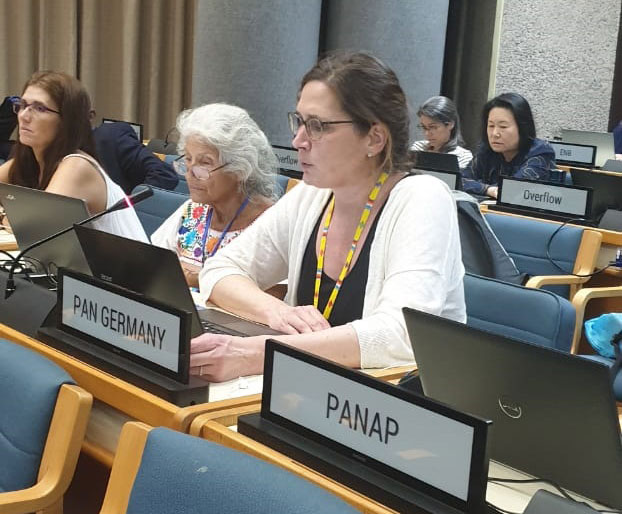PAN International Closing Statement SAICM IP4.2

(Delivered by Susan Haffmans of PAN Germany on behalf of PAN International)
Thank you madamme Co-Chairs for the opportunity to give our closing statement. I speak on behalf of Pesticide Action Network International, a global network of 600 groups representing CSOs, farmers, women and agricultural workers.
PAN has been involved in the SAICM process from the beginning and fully committed to SAICM’s objective to minimize significantly the adverse impacts of chemicals particularly hazardous pesticides on the environment and human health.
Global production of chemicals is set to double by 2030, increasing pollution and accelerating catastrophic declines in nature and causing illness and loss of life. We as stakeholders are committed to tackle this global emergency.
For PAN International our primary concern is the issue of pesticides particularly, Highly Hazardous Pesticides. HHPs constitute a relatively small share of all pesticides registered globally, and yet they cause the most harm. As stated by FAO and WHO, [I quote] “the continued use of HHPs undermines the attainment of several Sustainable Development Goals (SDGs) because of their adverse effects on health, food security, biodiversity and other environmental negative impacts”.
There are estimated 385 million unintended pesticide poisonings every year, an unknown number of long-term effects including different types of cancer and over 150,000 pesticide-related suicides. The African Group reminded us here that behind each number stands a farmer, a worker, a family, or a child harmed by pesticides and each poisoning case has a wider impact on their family, community and their economic well beeing.
Solutions exist. HHPs have been successfully phased out from agriculture in a number of countries without affecting agricultural productivity.[1] National bans on HHPs are an effective and affordable intervention for reducing deaths and harm from pesticide poisoning.[2]
Therefore, we applaud the African Group for proposing a Global Alliance on Highly Hazardous Pesticides to deliver a robust and inclusive global process to drive progress. We hope it will achieve successes similar to the Global Alliance to Eliminate Lead Paint. We call all Stakeholders here to support this initiative. Concerted international action is urgently needed, including through partnerships among governments, intergovernmental organisations, civil society organisations, farmers’ organisations and agricultural workers’ trade unions, to address the challenges and provide support to countries.
Finally, Madame CO-Chairs and Madame President, we are hopeful that we will adopt a strong, ambitious framework in Bonn that would ensure a toxic free future and the right for a healthy environment as declared by the UN General Assembly.
We look forward to working with you all towards this objective.
[1] FAO/WHO 2019, Detoxifying agriculture and health from highly hazardous pesticides
[2] WHO/FAO 2020, Preventing suicide: a resource for pesticide registrars and regulators
